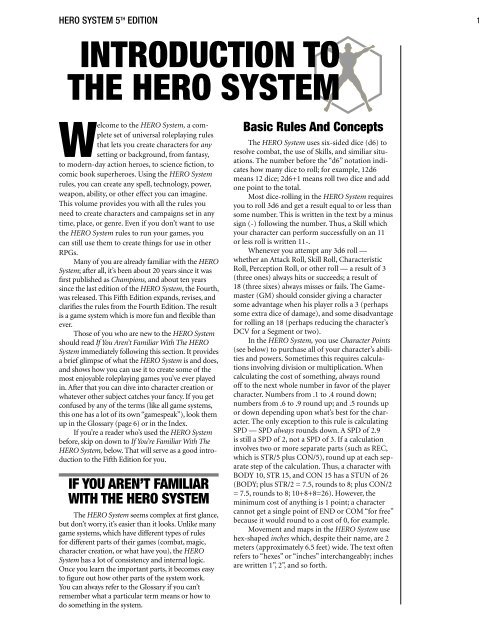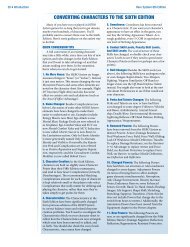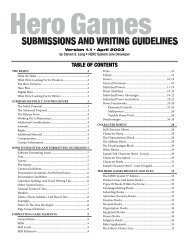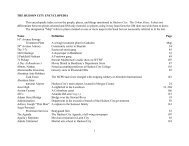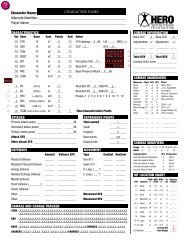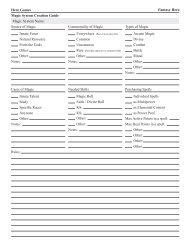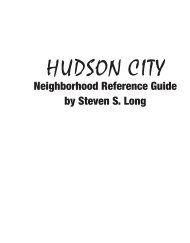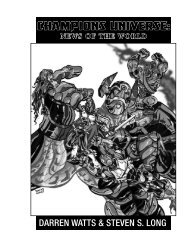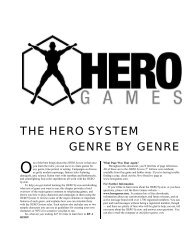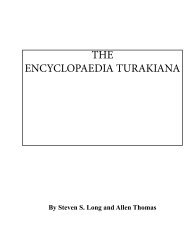INTRODUCTION TO THE HERO SYSTEM - HERO Games
INTRODUCTION TO THE HERO SYSTEM - HERO Games
INTRODUCTION TO THE HERO SYSTEM - HERO Games
You also want an ePaper? Increase the reach of your titles
YUMPU automatically turns print PDFs into web optimized ePapers that Google loves.
<strong>HERO</strong> <strong>SYSTEM</strong> 5 TH EDITION<br />
1<br />
<strong>INTRODUCTION</strong> <strong>TO</strong><br />
<strong>THE</strong> <strong>HERO</strong> <strong>SYSTEM</strong><br />
Welcome to the <strong>HERO</strong> System, a complete<br />
set of universal roleplaying rules<br />
that lets you create characters for any<br />
setting or background, from fantasy,<br />
to modern-day action heroes, to science fiction, to<br />
comic book superheroes. Using the <strong>HERO</strong> System<br />
rules, you can create any spell, technology, power,<br />
weapon, ability, or other effect you can imagine.<br />
This volume provides you with all the rules you<br />
need to create characters and campaigns set in any<br />
time, place, or genre. Even if you don’t want to use<br />
the <strong>HERO</strong> System rules to run your games, you<br />
can still use them to create things for use in other<br />
RPGs.<br />
Many of you are already familiar with the <strong>HERO</strong><br />
System; after all, it’s been about 20 years since it was<br />
first published as Champions, and about ten years<br />
since the last edition of the <strong>HERO</strong> System, the Fourth,<br />
was released. This Fifth Edition expands, revises, and<br />
clarifies the rules from the Fourth Edition. The result<br />
is a game system which is more fun and flexible than<br />
ever.<br />
Those of you who are new to the <strong>HERO</strong> System<br />
should read If You Aren’t Familiar With The <strong>HERO</strong><br />
System immediately following this section. It provides<br />
a brief glimpse of what the <strong>HERO</strong> System is and does,<br />
and shows how you can use it to create some of the<br />
most enjoyable roleplaying games you’ve ever played<br />
in. After that you can dive into character creation or<br />
whatever other subject catches your fancy. If you get<br />
confused by any of the terms (like all game systems,<br />
this one has a lot of its own “gamespeak”), look them<br />
up in the Glossary (page 6) or in the Index.<br />
If you’re a reader who’s used the <strong>HERO</strong> System<br />
before, skip on down to If You’re Familiar With The<br />
<strong>HERO</strong> System, below. That will serve as a good introduction<br />
to the Fifth Edition for you.<br />
IF YOU AREN’T FAMILIAR<br />
WITH <strong>THE</strong> <strong>HERO</strong> <strong>SYSTEM</strong><br />
The <strong>HERO</strong> System seems complex at first glance,<br />
but don’t worry, it’s easier than it looks. Unlike many<br />
game systems, which have different types of rules<br />
for different parts of their games (combat, magic,<br />
character creation, or what have you), the <strong>HERO</strong><br />
System has a lot of consistency and internal logic.<br />
Once you learn the important parts, it becomes easy<br />
to figure out how other parts of the system work.<br />
You can always refer to the Glossary if you can’t<br />
remember what a particular term means or how to<br />
do something in the system.<br />
Basic Rules And Concepts<br />
The <strong>HERO</strong> System uses six-sided dice (d6) to<br />
resolve combat, the use of Skills, and similiar situations.<br />
The number before the “d6” notation indicates<br />
how many dice to roll; for example, 12d6<br />
means 12 dice; 2d6+1 means roll two dice and add<br />
one point to the total.<br />
Most dice-rolling in the <strong>HERO</strong> System requires<br />
you to roll 3d6 and get a result equal to or less than<br />
some number. This is written in the text by a minus<br />
sign (-) following the number. Thus, a Skill which<br />
your character can perform successfully on an 11<br />
or less roll is written 11-.<br />
Whenever you attempt any 3d6 roll —<br />
whether an Attack Roll, Skill Roll, Characteristic<br />
Roll, Perception Roll, or other roll — a result of 3<br />
(three ones) always hits or succeeds; a result of<br />
18 (three sixes) always misses or fails. The Gamemaster<br />
(GM) should consider giving a character<br />
some advantage when his player rolls a 3 (perhaps<br />
some extra dice of damage), and some disadvantage<br />
for rolling an 18 (perhaps reducing the character’s<br />
DCV for a Segment or two).<br />
In the <strong>HERO</strong> System, you use Character Points<br />
(see below) to purchase all of your character’s abilities<br />
and powers. Sometimes this requires calculations<br />
involving division or multiplication. When<br />
calculating the cost of something, always round<br />
off to the next whole number in favor of the player<br />
character. Numbers from .1 to .4 round down;<br />
numbers from .6 to .9 round up; and .5 rounds up<br />
or down depending upon what’s best for the character.<br />
The only exception to this rule is calculating<br />
SPD — SPD always rounds down. A SPD of 2.9<br />
is still a SPD of 2, not a SPD of 3. If a calculation<br />
involves two or more separate parts (such as REC,<br />
which is STR/5 plus CON/5), round up at each separate<br />
step of the calculation. Thus, a character with<br />
BODY 10, STR 15, and CON 15 has a STUN of 26<br />
(BODY; plus STR/2 = 7.5, rounds to 8; plus CON/2<br />
= 7.5, rounds to 8; 10+8+8=26). However, the<br />
minimum cost of anything is 1 point; a character<br />
cannot get a single point of END or COM “for free”<br />
because it would round to a cost of 0, for example.<br />
Movement and maps in the <strong>HERO</strong> System use<br />
hex-shaped inches which, despite their name, are 2<br />
meters (approximately 6.5 feet) wide. The text often<br />
refers to “hexes” or “inches” interchangeably; inches<br />
are written 1”, 2”, and so forth.
2 <strong>HERO</strong> <strong>SYSTEM</strong> 5 TH EDITION<br />
Character Creation<br />
The heart of the <strong>HERO</strong> System is its rules<br />
for character creation. Using them, you can create<br />
any type of character, power, gadget, or ability you<br />
want, subject to the GM’s campaign restrictions.<br />
You build <strong>HERO</strong> System characters with Character<br />
Points. Everything the character can do, from<br />
his ability to lift heavy objects to his ability to use<br />
magic or superpowers, is purchased with Character<br />
Points.<br />
Your GM will tell you how many points you<br />
have to build your character with; the more points,<br />
the more powerful the character, generally. Some<br />
of your Character Points are “free” (given to you<br />
by the GM); you acquire others by taking Disadvantages,<br />
or complications for, your character.<br />
The main purpose of Disadvantages is to simulate<br />
character conception, but they are also worth<br />
extra Character Points. For example, your character<br />
might be Hunted by an old enemy, or adhere to<br />
a Code Of Honor, or be missing one eye. Each<br />
of these Disadvantages give you extra Character<br />
Points to build your character with.<br />
There are five things that can be bought with<br />
Character Points: Characteristics, Skills, Perks, Talents,<br />
and Powers.<br />
CHARACTERISTICS<br />
All characters have eight Primary Characteristics<br />
(such as Strength and Intelligence), which<br />
represent physical and mental capabilities; and six<br />
Figured Characteristics (such as Physical Defense<br />
or Stun), which are mainly used in combat. The<br />
text beginning on page 19 defines these Characteristics<br />
for you. An average human has Primary<br />
Characteristics of about 8-10.<br />
Primary Characteristics all have Characteristic<br />
Rolls equal to 9 + (Characteristic/5) or less. For<br />
example, a character with a DEX of 20 has a DEX<br />
Roll of 13- (9 + (20/5)=13). When the GM asks<br />
you to make a Characteristic Roll (such as a DEX<br />
Roll to walk along a narrow beam), you roll 3d6<br />
like normal. The more you make (or fail) the roll<br />
by, the greater your degree of success (or failure).<br />
The GM imposes negative modifers on the Characteristic<br />
Roll when you attempt particularly difficult<br />
feats, making it harder to succeed.<br />
SKILLS<br />
A character’s Skills represent specialized<br />
knowledge or training he possesses. This includes<br />
such things as knowing how to fly a plane, investigate<br />
a crime scene, or fire a blaster pistol, or the<br />
character’s in-depth knowledge about any subject<br />
you can think of (physics, Fire Demons, Great Britain,<br />
alien races...). Skills are listed and described<br />
beginning on page 26.<br />
A character can try to get information, perform<br />
a task, or gain other benefits from knowing<br />
a Skill by making a Skill Roll. Each Skill has a Skill<br />
Roll, typically between 8- and 18- (the higher, the<br />
better). Most Skills are based on a Characteristic,<br />
just like Characteristic Rolls, and all of them are<br />
rolled the same way: roll 3d6; if the total on the<br />
dice is less than or equal to your Skill Roll, your<br />
character succeeds; if it is higher than the Skill Roll,<br />
he fails.<br />
PERKS<br />
Perks are special resources a character has<br />
access to — money or property (like a really fast car<br />
or headquarters), contacts, permits or licenses, and<br />
the like. The Perks which a character can purchase<br />
are listed and described beginning on page 55.<br />
TALENTS<br />
Talents are unusual abilities or attributes a<br />
character possesses. They are usually better than<br />
Skills, but not quite as powerful as Powers — in<br />
fact, they’re sort of a cross or “middle ground”<br />
between the two. They include things like a natural<br />
sense of direction, a “sixth sense” for danger, having<br />
extremely fast reflexes, or being able to speed read.<br />
Some of them involve rolls similar to Skill Rolls;<br />
others function automatically. They are described<br />
beginning on page 61.<br />
POWERS<br />
Powers are abilities possessed by some characters.<br />
Typically they are abilities “beyond those<br />
of normal men,” though Powers can also be used<br />
to create many abilities and devices which are perfectly<br />
appropriate for characters who are “normal<br />
men.” Each Power costs a certain amount of<br />
Character Points, depending upon how powerful<br />
or useful it tends to be. Some Powers have an incremental<br />
cost, such as 5 Character Points per d6 of<br />
effect. They are described starting on page 67.<br />
You can create any ability you can think of —<br />
flying, becoming invisible or intangible, changing<br />
shape, firing energy bolts or mental blasts — using<br />
Powers. They can simulate a superhero’s powers,<br />
a wizard’s spells, or a vigilante’s super-skills, just<br />
to name a few. You also use Powers to construct<br />
equipment and weapons.<br />
POWER FRAMEWORKS<br />
Sometimes Powers are bought through Power<br />
Frameworks — ways to group Powers so they cost<br />
fewer points. However, this savings entails some<br />
restrictions on when and how the character can<br />
use the Powers in his Framework. There are three<br />
types of Frameworks — Elemental Controls, Multipowers,<br />
and Variable Power Pools — which are<br />
explained in detail on pages 203-210.<br />
Combat<br />
<strong>HERO</strong> System combat offers your character<br />
the chance to do just about anything you can think<br />
of. The rules provide lots of options, but you don’t<br />
have to learn them all at once. Instead, start out<br />
with the basics, and learn the details as you play.<br />
The basics are:<br />
INITIATIVE<br />
Two of a character’s Characteristics — Dexterity<br />
(DEX) and Speed (SPD) — determine when he acts<br />
in combat, and how often. The rules divide combat<br />
time into 12-second Turns, with each second referred
<strong>HERO</strong> <strong>SYSTEM</strong> 5 TH EDITION<br />
3<br />
to as a Segment. The character’s SPD indicates which<br />
Segments he can take an Action in; these Segments are<br />
his Phases. Thus, a character with 5 SPD has 5 Phases<br />
— five times each Turn when he can act. The Speed<br />
Chart (page 232) indicates the Phases for each SPD.<br />
In each Segment, several characters may have a<br />
Phase — for example, characters with SPD 3 and SPD<br />
6 both act in Segment 4. All characters who can act in<br />
a Phase act in order of DEX, from highest to lowest.<br />
Thus, a character with DEX 20 acts before one with<br />
DEX 18; however, a character may Hold his Action<br />
and act later in the Phase if he wants.<br />
ACTIONS<br />
A character may take an Action in each of his<br />
Phases. His Actions may include Full Moves (which<br />
require his entire Phase) or Half Moves, which require<br />
only half of his Phase (in other words, he can perform<br />
two Half Moves per Phase). Full Moves include using<br />
more than half of your inches of movement or recovering<br />
from being Stunned. Half Moves include using<br />
up to half your inches of movement.<br />
Attacks are a special type of Action. A character<br />
may make a Half Move and then attack; in that case,<br />
the attack is considered a Half Move, too. But if a<br />
character makes an attack before making any Half<br />
Moves, the attack is considered a Full Move. In other<br />
words, once you make an attack, that’s all you can do<br />
that Phase.<br />
Some Actions take so little time to perform that<br />
they are Zero-Phase Actions. Characters can perform<br />
Zero-Phase Actions at the beginning of a Phase or<br />
after making a Half Move, but not after making an<br />
attack. Zero-Phase Actions include turning a Power<br />
on or off.<br />
Some Actions take no time at all, and can be<br />
performed whenever a character wishes, even if he<br />
doesn’t have a Phase or has already acted in a Phase.<br />
No time Actions include making a Presence Attack,<br />
speaking, or making a roll when the GM asks you to.<br />
See pages 233-237 for more information.<br />
DOING AND TAKING DAMAGE<br />
If your character hits his target with an attack,<br />
the attack does damage. There are two basic types of<br />
damage in the <strong>HERO</strong> System: STUN damage and<br />
BODY damage. Taking STUN damage decreases<br />
your character’s STUN and can knock you out;<br />
taking BODY damage decreases your BODY, which<br />
causes injuries and can kill your character. All types<br />
of attacks cause one or both types of damage. Some,<br />
such as Drains or Ego Attacks, only cause STUN<br />
damage. Most, such as Energy Blasts, punches, guns,<br />
and knives, cause both STUN and BODY.<br />
Another important distinction is between<br />
Normal Damage attacks and Killing Damage attacks.<br />
Most attacks do Normal Damage, but Killing Attacks<br />
do Killing Damage (which, as its name implies, is<br />
deadlier). Normal Damage and Killing Damage are<br />
calculated differently and applied to defenses differently.<br />
See page 273 for more information.<br />
Characters have defenses which protect them<br />
against damage. All characters have Physical Defense,<br />
or PD (which protects against physical attacks like<br />
punches and clubs) and Energy Defense, or ED (which<br />
protects against energy attacks like energy bolts or<br />
fire). PD and ED are Normal Defenses; they protect<br />
against Normal Damage. The character subtracts his<br />
defenses from the STUN and BODY damage done<br />
ATTACKS<br />
A character’s Combat Value, or CV, determines<br />
his chance to hit targets in combat, and to avoid being<br />
hit. A character’s CV is equal to his (DEX/3). Thus, a<br />
character with DEX 20 has a CV of 7 (20/3=7).<br />
CV is divided into two subcategories, Offensive<br />
Combat Value (OCV) and Defensive Combat Value<br />
(DCV). OCV and DCV are both equal to CV. Thus, a<br />
character with a CV of 7 has OCV 7, DCV 7. Various<br />
Combat Maneuvers, Combat Skill Levels, and other<br />
factors may modify a character’s OCV or DCV.<br />
To attack, roll 3d6. To hit, you need to roll less<br />
than or equal to a number calculated with this formula:<br />
11 + Attacker’s OCV - Defender’s DCV. Thus, if<br />
the attacker has OCV 6, and the defender has DCV 4,<br />
the attacker must roll (11+6-4=13) 13 or less to hit.<br />
Mental Attacks are slightly different. They use<br />
Ego Combat Value (ECV), equal to (EGO/3). Otherwise,<br />
making a Mental Attack is basically the same as<br />
making any other kind of attack.<br />
See pages 243-246 for more information.
4 <strong>HERO</strong> <strong>SYSTEM</strong> 5 TH EDITION<br />
to him, and applies the remainder (if any) to his<br />
STUN and BODY. If a character hit with a 22 STUN,<br />
6 BODY physical attack has 10 PD, he takes 12 STUN<br />
(22-10) and 0 BODY (6-10). But Normal Defenses<br />
offer no protection against Killing Damage; for that,<br />
characters need Resistant Defenses, such as Armor or a<br />
Force Field. See page 273 for more information.<br />
<strong>THE</strong> EFFECTS OF DAMAGE<br />
If a character loses more STUN from a single<br />
attack than he has points of CON, he becomes<br />
Stunned (dazed and unable to act). In the above<br />
example, if the character has a CON of 12 or higher,<br />
he won’t be Stunned by that attack; if his CON is 11<br />
or less, he’s Stunned. A Stunned character must spend<br />
a Phase to recover from being Stunned before he can<br />
act again.<br />
If a character loses all of his STUN from one<br />
or more attacks, he’s Knocked Out (unconscious)<br />
and completely unable to act. However, he wakes up<br />
when he regains STUN. Characters regain lost STUN<br />
by taking Recoveries. For each Recovery taken, the<br />
character gets back his Recovery Characteristic (REC)<br />
worth of STUN and END.<br />
If a character loses BODY, he’s injured — he<br />
suffers burns, cuts, bleeding wounds, broken bones,<br />
and so forth. If he loses all of his BODY (down to<br />
0 BODY), he begins to bleed to death. When he<br />
reaches his negative BODY (for example, -10 BODY<br />
for someone who normally has 10 BODY), he dies.<br />
Characters heal BODY damage at the rate of REC in<br />
BODY per month.<br />
See pages 273-275 for more information.<br />
What Else You Need To Play<br />
The <strong>HERO</strong> System Rulebook, 5 th Edition contains<br />
everything you need to create characters and settings<br />
for a roleplaying campaign. All you need is paper to<br />
write your character down on and some dice. If you’re<br />
the GM, you’ll either have to create a setting and<br />
adventures for your campaign, or use published ones.<br />
The Ultimate Gamer’s Toolkit<br />
Maybe you’re used to playing other game systems.<br />
We hope you’ll switch over to using the <strong>HERO</strong><br />
System, but even if you don’t want to do that, you<br />
can still use the <strong>HERO</strong> System to improve your other<br />
game.<br />
The <strong>HERO</strong> System is the ultimate gamer’s toolkit.<br />
It can be used to build anything, from characters, to<br />
weapons, to spells, to vehicles, to whatever else you<br />
can think of. Because of the system’s internal rules<br />
and logic, characters, spells, and other game elements<br />
which have the same or similar point cost have the<br />
same or similar effectiveness or power, all other things<br />
being equal. This makes it easy to determine whether<br />
a new item, spell, or power is unusually powerful and<br />
effective before you use it in game play. Few game<br />
systems provide this sort of resource. GMs and players<br />
who want to create something new typically have<br />
to “guesstimate” whether it will be effective and balanced,<br />
or unusually powerful (and thus unbalancing<br />
within the campaign).<br />
With the <strong>HERO</strong> System, you can be more precise.<br />
Figure out how to create your new item or spell using<br />
the <strong>HERO</strong> System, then create a similar item or spell<br />
from that other game and compare the two. This will<br />
give you a good idea of whether your new creation<br />
works well as-is, or needs some adjustment. Once<br />
your new creation is effective and balanced, simply<br />
convert it over to the other rule system, and you’re set!<br />
Go Out And Be A <strong>HERO</strong>!<br />
Those are the basics. Now you can start designing<br />
your first character and get ready to play your first<br />
game!<br />
IF YOU’RE FAMILIAR WITH<br />
<strong>THE</strong> <strong>HERO</strong> <strong>SYSTEM</strong><br />
You’ve waited for it a long time, and here it is:<br />
the Fifth Edition. You’ve been helping us playtest it<br />
for ten years, and it’s taken months to pull together<br />
our notes and your suggestions and write it. It reflects<br />
an additional decade’s worth of experience with the<br />
system, and incorporates new rules from Dark Champions,<br />
the Ultimate series, the <strong>HERO</strong> System Almanacs,<br />
and other products published during that time. We<br />
think the new <strong>HERO</strong> System rules are at once the most<br />
comprehensive and streamlined ever — the best we’ve<br />
yet produced — and we hope you’ll agree.<br />
Where’d It Go?<br />
You’ll find that some Skills, Talents, Powers, or<br />
rules have moved. For example, Fast Draw is now a<br />
Skill, Find Weakness and Luck are Powers, and Instant<br />
Change has been eliminated as a separate Power (it’s<br />
now a type of Transform). If you have trouble finding<br />
something, just consult the Index.<br />
Converting Fourth<br />
Edition Characters<br />
Many of you have run or played in <strong>HERO</strong> System<br />
games for so long that you’ve got dozens, maybe<br />
even hundreds, of characters. You’ll probably want to<br />
convert them over to Fifth Edition. In most cases, no<br />
substantial changes are needed. That was our intention;<br />
we didn’t want to make changes which were<br />
marginally useful but would require the revision of<br />
thousands of characters.<br />
If the cost or nature of some of a character’s abilities<br />
has changed, the GM can use several approaches<br />
to resolve the situation. Guide yourself by what the<br />
player wants to do, what’s most appropriate for the<br />
character, and what fits the character’s concept the<br />
best.<br />
In some cases, such as Flash, the change is really<br />
only cosmetic. In that case, you simply double the<br />
number of dice of Flash you have, since the cost has<br />
been changed, but so has the way the Power works —<br />
you don’t have to buy more, or fewer, dice to achieve<br />
the effect you were already achieving. Just change the
<strong>HERO</strong> <strong>SYSTEM</strong> 5 TH EDITION<br />
5<br />
number on the character sheet and move on.<br />
However, there are cases, such as Aid, where the<br />
cost of a Power has increased, but the effectiveness has<br />
stayed the same. In short, a Fourth Edition character<br />
with, say, an 8d6 Aid now can only buy a 4d6 Aid for<br />
the same points. Several options are available. The<br />
fairest one is for the GM to “grandfather” the character,<br />
giving him the additional Character Points he<br />
needs to keep the character at the same level of power<br />
for free. It’s not very equitable to cut a character’s<br />
power in half just because the rules have changed; if<br />
the character was doing 8d6 Aid before, he probably<br />
ought to continue doing 8d6 Aid. Penalizing the character<br />
because of a change in the game system isn’t just.<br />
Sidebars throughout this book provide specific notes<br />
on grandfathering characters.<br />
However, in some situations, many GMs would<br />
rather not “grandfather” characters this way for<br />
reasons of campaign balance or fairness between<br />
characters. In that case, players will just have to reduce<br />
their characters’ level of power. At his option, the GM<br />
might give them some free Character Points to buy<br />
some other abilities or powers to make up for the loss,<br />
or eliminate a Disadvantage or two.<br />
Sometimes the Fifth Edition rules provide a way<br />
to do something easily which was difficult under the<br />
Fourth Edition rules. For example, a character might<br />
have bought Summon with a Linked Mind Control<br />
effect to guarantee that his summoned creatures<br />
would obey him. Now Summon can do that by itself.<br />
The character should reconfigure his power according<br />
to the new rules. If the new power costs more, the GM<br />
should consider “grandfathering” him, as discussed<br />
above.<br />
In any case where a change in the <strong>HERO</strong> System<br />
rules saves your character points, congratulations!<br />
You have some additional points you can spend (perhaps<br />
on new abilities from this book). GMs should<br />
not deprive characters of saved points just because a<br />
change in the rules makes something cheaper.


